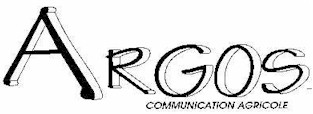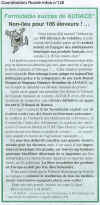Agriculture raisonnée
Reasoned agriculture
„wohl überlegt"
Is this really reasonable ?!
-raisonné : carefully thought out; measured; sensible; cautious; moderate ...
-UIPP (see also CPA in the UK)
-FARRE (see also LEAF in the UK)
Forum for Reasoned Agriculture which Respects the Environment = Forum de l’Agriculture Raisonnée Respectueuse de l’Environnement
-TGAP (see also the tax on pesticide debated in the UK)
Ist dieses wirklich „wohl überlegt"?!
-raisonné: besonnen, gut durchdacht, wohl überlegt,.....
- UIPP (siehe auch IVA - Industrieverband Agrar in der BRD)
-FARRE (siehe auch FNL in der BRD)
FARRE ( Forum für eine wohl überlegte Landwirtschaft,welche die Umwelt respektiert)
-TGAP (Steuer auf den pflanzenschutzlichen Produkten)
'Reasoned agriculture', the industry's answer to sustainable agriculture.
.../...
The agrochemicals industry fears the introduction of an independent, high-performance safety system, and it is taking advantage of the inertia of the public authorities in the area of health and environmental safety.
So greatly does the industry dislike the idea of being monitored by structures over which it has no control that it prefers to put such structures in place itself, even if it means financing them.
.../...
In the UK, as one can read in FarmersWeekly 1-7 June, CPA's Patrick Goldsworthy speaks with single minded vehemence of what aspects of crop protection pose the greatest risk to the environment and biodiversity :
- farmers, their practices and their equipment !
read further : The ‘reasoned’ viewpoint of AUDACE
¯¯¯
L'idée selon laquelle la responsabilité d'une agriculture de qualité respectueuse de l'environnement n'incombe qu'aux agriculteurs et, qu'en regard de l'urgence environnementale, il convient de leur imposer un code de bonne conduite supplémentaire relève à présent d'une pensée unique de l'industrie agrochimique et dogmatisée par les organismes, groupements, associations ou syndicats qu'elle a créés à cette fin et qu'elle finance.
En France, FARRE (Forum de l'Agriculture Raisonnée Respectueuse de l'environnement) est l'association par laquelle l'industrie véhicule cette pensée.
.../...
lire : Le point de vue "Raisonné" d'AUDACE
¯¯¯
Was AUDACE unter „wohl überlegt" versteht.
In Großbritannien, wie bei Farmers Weekly 1 – 7 Juni zu lesen ist, spricht Patrick Goldworthy von CPA mit beharrlicher Vehemenz darüber, welche Aspekte der Schädlingsbekämpfung für die Umwelt und für die Artenvielfalt am schädlichsten seien:
- die Landwirte, ihre Praktiken und ihre Geräte.
Zur Zeit gibt es einen Grundgedanken innerhalb der agrochemischen Industrie: Der Landwirt trägt die alleinige Verantwortung für eine umweltgerechte Landwirtschaft; ihm müssen angesichts der ökologischen Dringlichkeit eine ganze Reihe zusätzlicher Verhaltensregeln aufgezwungen werden. Diese Vorstellung wird zum Dogma erhoben und durch die Geschäftsstellen, Gruppen, Gesellschaften und Verbände, die zu diesem Zweck von der Industrie ins Leben gerufen wurden und finanziert werden, propagiert.
In Frankreich vermittelt die Industrie diese Vorstellung durch FARRE (Forum de l’Agriculture Raisonnée Respectueuse de l’Environnement.)
Im Rahmen ihrer gesetzlichen Pflicht ist der AUDACE Verband der Auffassung, es sei höchste Zeit, diese industriellen Initiativen im wahren Zusammenhang zu sehen, der zwar nicht grundsätzlich nachteilig zu sein scheint, sich jedoch äußerst irreführend auf die öffentliche Meinung auswirkt, und sehr weit von dem entfernt ist, was die Gesellschaft sich unter Debatte und objektiven Lösungen vorstellt.
Die agrochemische Industrie fürchtet die Einführung eines unabhängigen, leistungsfähigen Sicherheitssystems und nützt die Trägheit der Staatsorgane auf dem Gebiet der Sicherheit für Gesundheit und Umwelt.
Die Industrie ist so sehr gegen eine Überprüfung durch Strukturen, die sie nicht fest im Griff hat, dass sie es vorzieht, selber solche Strukturen aufzubauen; auch wenn es bedeutet, dass sie sie finanzieren muss.
...
When a French consumer insists on buying food bearing the logo 'AGRICULTURE RAISONNEE '
None of them acts according to national prejudices,
In fact, they merely follow beacons and markers common to a global industry's global strategy.
¯
In Europe, 6 national associations promote Integrated Farming and are grouped together under the name EISA (European Initiaitive for Sustainable Development in Agriculture).
These associations are : FARRE, in France, FILL, in Luxembourg FNL, in Germany, L'Agricoltura che Vogliamo, in Italy. LEAF, in United Kingdom, Odling i Balans, in Sweden,
EISA is based in Bonn
In Europa fördern 6 nationale Gesellschaften die Integrierte Landwirtschaft und bilden eine Gruppe unter dem Namen EISA ( Europäische Initiative für eine nachhaltig zukunftsverträglichen Entwicklung in der Landwirtschaft.)
Diese Gesellschaften sind: FARRE, in Frankreich, FILL, in Luxembourg, FNL, in der BRD L'Agricoltura che Vogliamo, in Italien, LEAF, in Großbritannien, Odling i Balans, in Schweden
EISA hat ihren Sitz in Bonn
Articles you will find
in the monthly bulletin of the Federal Consumers Union
'Que Choisir' :
No. 379 February 2001
The deceivers in agrochemicals
Two canisters, two standards of measurement
The manufacture, solely responsible
who only swear by environmental protection
are more than can be hoped for.
But behind the scenes, the reality is very different
On the farm, industrial pesticide manufacturers claim to be the best protectors of crops and of the environment. They are involved in all the operations aimed at protecting rivers and ground water from their own products, and finance forums and congresses about it. By and large, they subscribe to an environmental charter which defines "the protection of the environment and the preservation of health as a standing obligation".
In the garden, we are still far from this idyllic situation. The drive for profit, and retaining or acquiring market share have little concern for environmental considerations. A few examples prove this.
- In 1997, the multinational agrochemical company Zeneca marketed a new fungicide intended for the treatment of cereals. Christened Amistar, it enjoyed great success and established itself as Number One. But in France, Zeneca limited it to a circle of exclusive distributors. A crop protection wholesaler who was not authorised to sell it decided to import it. He obtained his supplies in Germany.
Out of concern to inform his customers, he had the label translated. In compliance with the guidance given across the Rhine, he included the statement "toxic to aquatic life; may cause long-term harmful effects to the environment" on the packaging which he marketed in France. If only he hadn’t! ..............
Another multinational that seeks to be the chorus master for rational agriculture is BASF. You only have to visit its website to learn that "economic interests do not take priority over safety, protection of the environment and the preservation of health". Indeed! In the sixties, BASF discovered a new herbicide, chloridazon. It is registered for beet crops. However, its manufacturing process had a major drawback. The process unavoidably produces iso-chloridazon, an isomer with no herbicidal action but with a polluting effect; it degrades neither in the soil nor in water. A necessary evil, in a way. At the end of the seventies, a new method was perfected. It was possible to avoid producing the inactive isomer. To protect this new manufacturing process, BASF filed a patent in 1982. But it made no use of it...............
-
Champagne taboo
"Threat to champagne". Last December, we lifted the cloak of secrecy covering a taboo subject in the world of champagne. A completely new weedkiller presented as environmentally friendly spared perhaps almost everything.... except the vine !
- One could go on citing examples. Let us just deal with this case, an example of combining substances which do not need to be ... according to the producer itself.......................
The problem with a completely new flazasulfuron-based weedkiller in Champagne (QC No. 377), the problem with Gaucho, an imidacloprid-based treatment for sunflowers which disorientates foraging bees (QC No. 348): the registration process for crop protection products has had some failures. The reason: the shortcomings of the ecotoxicological studies submitted by companies.............................
The registration procedure for pesticides poses a problem. We have demonstrated this with the case of Gaucho in 1998, and with flazasulfuron and champagne last December. Having sat on a registration committee under the control of the Minister of Agriculture, in a symbolic capacity and without the power to make decisions, the Minister of the Environment is now convinced of this. "The degree to which this Committee takes account of the environment is still very inadequate", as ...........................
website : http://www.quechoisir.org
Read the whole stories in
'Que Choisir'
Follow the links:
- recherche thématique:
environnement
- journal
- industrie agrochimique
Titre de l'article :
les
faux-semblants
de l'agrochimie
Type de l'article
Enquête
Date de parution :
mensuel février 2001
article from
ARGOS
>
BASF victime de la "nouvelle réalité économique" ?
BASF victim of economic reality ?
Superbe
de
Josette Argaud
L'AGROCHIMIE EPINGLEE PAR QUE CHOISIR

La revue QUE CHOISIR de février démontre que les producteurs de pesticides ont un discours de façade à propos de l'environnement. Trois exemples d'abus sont mis en évidence. Il y a le fameux brevet inexploité de BASF (cf ARGOS décembre). Il y a aussi l'histoire du packaging de Sandoz. La firme vendait deux produits liés (un fongicide et un insecticide) à la plupart de la distribution alors que certaines coopératives pouvaient acheter séparément le fongicide. Il y a aussi, moins connue, la cocasse aventure vécue par un négociant. Il achète Amistar en Allemagne et il traduit l'étiquette apposée sur le bidon en langue française. Sur les bidons qu'il revend en France apparaît alors la mention "toxique pour les organismes aquatiques ; peut entraîner des effets néfastes à long terme pour l'environnement"
La société Zeneca l'attaque alors au motif que son produit n'aurait jamais dû être accompagné de cette mention par rapport à l'environnement. En France, le produit a reçu une AMM sans l'obligation de porter cette mention.
Or, le dossier d'homologation présenté aux autorités européennes par Zeneca signale le risque par rapport à la faune aquatique...
La revue Phytoma en prend également pour son grade puisque sous un prétexte fallacieux, elle ne consacre que quelques mots au produit herbicide flazasulfuron (Mission ou Katana) qui a provoqué de grands maux sur le vignoble champenois. Rappelons au passage que le ministère de l'agriculture apporte sa caution morale à la revue !
Interrogé par QUE CHOISIR, le président de l'association Audace dénonce le fait que la responsabilité des fabricants ne soit quasiment jamais mise en cause alors qu'à l'inverse, l'agriculteur est souvent désigné comme le seul coupable. La journaliste de QUE CHOISIR évoque donc tout naturellement les ratés de l'homologation et notamment les insuffisances des études toxicologiques présentées par les firmes que ce soit pour le gaucho ou le flazasulfuron.
Cet article ne passe pas inaperçu car la présidente de QUE CHOISIR, M-J Nicoli, est très impliquée dans Farre avec l'UIPP, le syndicat des firmes phytos, qui en est le principal bailleur de fonds.
De son côté, 60 MILLIONS DE CONSOMMATEURS de février estime que l'ivermectine, utilisée dans la lutte contre le varon ; continue à faire des dégâts en particulier en empoisonnant une espèce de chauve souris. De plus, l'ivermectine bénéficie de la complaisance de l'Afssa note la revue consumériste !
ARGOS n° 110 - Février 2001
email : ARGOS.Laluc@wanadoo.fr
ARGOS téléphone +33 (241) 73 01 34 - fax 36 08 09
BASF condamné à payer 62 millions $ aux agriculteurs
«
Le jury a décidé que
BASF s'était engagé dans des pratiques commerciales peu scrupuleuses tenant
à une injustice excessive.
De plus, BASF a été reconnu coupable de tromperie, de fraude... et de
mensonge par omission, de suppression et dissimulation de la vérité,
conformément à la loi du New Jersey sur la fraude contre le consommateur. »
BASF in America
« The jury determined that BASF engaged in unconscionable commercial practices, » said Hugh V. Plunkett, Lockridge Grindal Nauen, P.L.L.P., partner and lead trial attorney for the plaintiffs. « In addition, BASF was found guilty of deception, fraud...and a knowing omission, suppression and concealment of the truth, under the New Jersey Consumer Fraud Act. »
article from
ARGOS
<

Des producteurs de pesticides
qui ne jurent que par la protection de l'environnement, c'est inespéré.
Mais côté coulisses, la réalité est tout autre.
clicker à gauche sur l'image pour accéder au Site Web de l'Union Fédérale des Consomateurs 'Que Choisir' et suivre les indications ci-contre :
Suivre les liens suivants :
- recherche thématique: environnement
- journal
- industrie agrochimique
Titre de l'article : les faux-semblants de l'agrochimie Type de l'article : Enquête Date de parution : mensuel février 2001
